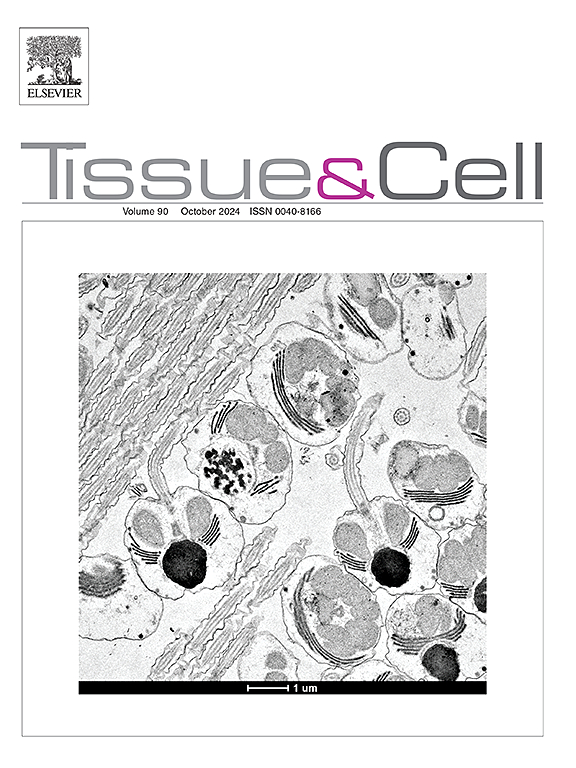灵芝酸A通过抑制gsdmd介导的焦亡来缓解银屑病
IF 2.5
4区 生物学
Q1 ANATOMY & MORPHOLOGY
引用次数: 0
摘要
目的银屑病是一种慢性炎症性皮肤病,其特征是炎症细胞浸润到真皮层。本研究旨在阐明灵芝酸A治疗银屑病的抗炎特性和潜在的分子机制。方法采用IMQ法建立小鼠银屑病模型,评价灵芝酸A对银屑病的体内治疗作用。采用银屑病面积和严重程度指数(PASI)评估皮损处皮肤炎症的严重程度。采用苏木精-伊红染色、RNA测序、免疫荧光等技术评价疗效。我们进行了体内和体外实验,以证实其临床相关性并探索其调控机制。结果灵芝酸A腹腔和外用均能有效缓解银屑病。具体来说,灵芝酸A导致皮肤厚度、红斑、结垢和炎症细胞因子表达的减少。从机制上看,灵芝酸A通过GSDMD途径抑制皮肤焦亡,从而减少皮肤炎症因子的分泌。结论阳极酸A具有治疗银屑病的潜力,可考虑将其纳入患者的饮食建议中。本文章由计算机程序翻译,如有差异,请以英文原文为准。
Ganoderic acid A alleviate psoriasis by inhibiting GSDMD-mediated pyroptosis
Objective
Psoriasis is a chronic inflammatory dermatological condition characterized by the infiltration of inflammatory cells into the dermal layer. This study aimed to elucidate the anti-inflammatory properties and underlying molecular mechanisms of Ganoderic acid A in the treatment of psoriasis.
Methods
A psoriasis model was induced in mice using IMQ to evaluate the effects of Ganoderic acid A in vivo. The Psoriasis Area and Severity Index (PASI) was employed to assess the severity of skin inflammation in the lesions. Techniques such as hematoxylin-eosin staining, RNA sequencing and immunofluorescence assays were utilized to evaluate the efficacy. Both in vivo and exvivo experiments were conducted to confirm the clinical relevance and explore the regulatory mechanisms involved.
Results
The findings demonstrated that both intraperitoneal and topical applications of Ganoderic acid A alleviate psoriasis effectively. Specifically, Ganoderic acid A resulted in a reduction in skin thickness, erythema, scaling and the expression of inflammatory cytokines. Mechanistically, Ganoderic acid A was shown to reduce the secretion of skin inflammatory factors by inhibiting pyroptosis through the GSDMD pathway.
Conclusion
Ganoderic acid A exhibits potential as a therapeutic agent for psoriasis and may be considered for inclusion in dietary recommendations for patients.
求助全文
通过发布文献求助,成功后即可免费获取论文全文。
去求助
来源期刊

Tissue & cell
医学-解剖学与形态学
CiteScore
3.90
自引率
0.00%
发文量
234
期刊介绍:
Tissue and Cell is devoted to original research on the organization of cells, subcellular and extracellular components at all levels, including the grouping and interrelations of cells in tissues and organs. The journal encourages submission of ultrastructural studies that provide novel insights into structure, function and physiology of cells and tissues, in health and disease. Bioengineering and stem cells studies focused on the description of morphological and/or histological data are also welcomed.
Studies investigating the effect of compounds and/or substances on structure of cells and tissues are generally outside the scope of this journal. For consideration, studies should contain a clear rationale on the use of (a) given substance(s), have a compelling morphological and structural focus and present novel incremental findings from previous literature.
 求助内容:
求助内容: 应助结果提醒方式:
应助结果提醒方式:


